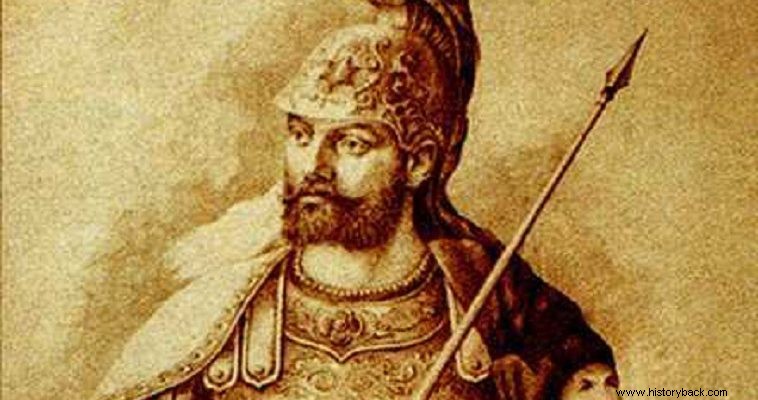
In our childhood we learned the legend of the Marble King. Centuries have passed since the City, "the joy and pride of all the Greeks," had been subjected to the most barbarous people. But the legend didn't die, how could it die, the legend, the very memory of Paleologos, who fights alone with thousands of enemies, even though he knows that eventually the barbarians will pass. Did not another king, 2000 years before him, know the same truth, when he fell "to the common people, literally persuaded", shouting Molon Lavet.
Was it not Palaiologos who was resurrected also in the form of Diakos and fought with a few lads the thousands of Omer Bryonis in Alamana, did not the angel give him the sword again and sent him to Pindos and Argyrokastro, did he not recently reincarnate and fought in long-suffering Cyprus, betrayed, attempting, even without a sword, to stop the barbarians? This was the Paleologos, the figure who gave vision, will to life and light to the enslaved Greeks, this was a source of inspiration that gave birth in 1821!
The attack
From April 5, 1453, Constantinople, the queen of cities, began to be encircled by Turkish verses. With thousands of soldiers and dozens of cannons, Mohammed II began the so-called siege. Despite his efforts, the City held on. Nor did his proposals to Constantine IA Paleologos regarding the surrender of Constantinople have any effect. So he decided on the final raid. The emperor received the sacraments, together with all the heads of the army and with other warriors and civilians, who with tears in their eyes embraced him and kissed his hand.
Immediately afterwards the King mounted his Arabian steed and disappeared into the night with his fellow soldiers. He reached the walls, unsheathed his sword and as a simple soldier took a position, in the most exposed point of the defense, at the cross (roughly repaired part of the wall that had been demolished by the artillery) of the gate of Ag. Romanou. It was well over night. May 29 was already in its early hours. The Turks launched a series of furious attacks and finally entered the City.
Death and the legend
Then Konstantinos decided to become a legend. "Ealo the City". The terrible scream echoed. "The City is taken and I still live," shouted the King in turn, and he rushed forward with sword in hand and with a few devoted companions to meet the glorious death he deserved. So Constantine, together with Francis Toledius, Theophilus Palaiologos and John Dalmatis, rushed against the enemy lines. Four against thousand. "They want to live or die," shouted Theophilos Paleologos and rushed the surf with his sword. These four men single-handedly covered the ground with corpses of enemies.
But then Constantine received the fatal blow. He only managed to scream before he fell "there is no Christian to take my head." "The king's partners stopped seeing him in battle. When he decided to die immediately, when it was known that the city had been taken, he fell out of sight," the chroniclers say. In agreement with the Duke, the Turks recognized the dead king by his red embrasures, decorated with double-headed eagles. His body was scraped, continues the Duke, and his skin was stuffed with straw, and he was excommunicated. Turkish cowardice and pettiness, even at the time of their victory, was and is indicative of the quality of their culture.
Whatever they did, however, together with the thousands of murders, rapes, robberies and lootings, the desolation and complete destruction of the beauty, the name of that king of cities, they achieved nothing. They have not succeeded and will never succeed in uprooting from the memories of a people the legend of the Greek who resists, regardless of the conditions of the struggle, who resists simply because he has to resist, because that is what his culture and history dictate.
As Doukas mentions "it was not possible to surrender the city to the Turks from the hands of the Greeks. Why, if this could happen, in which street or in which place, or in which city of Christians could the Greeks move without being humiliated and ashamed"? This very sacrifice of Palaiologos gave birth to the legend of the Marbled King whom an angel of the Lord "marbled" and hid in a cave. When the time comes the angel would again give the sword to the king to rise up and chase the Turks to the "Red Apple"... This is what our ancestors tried, 200 years ago, in 1821, and many before them immediately after the Fall, until success. Contrary to what some say, the years of slavery were years of war for the Greeks.
